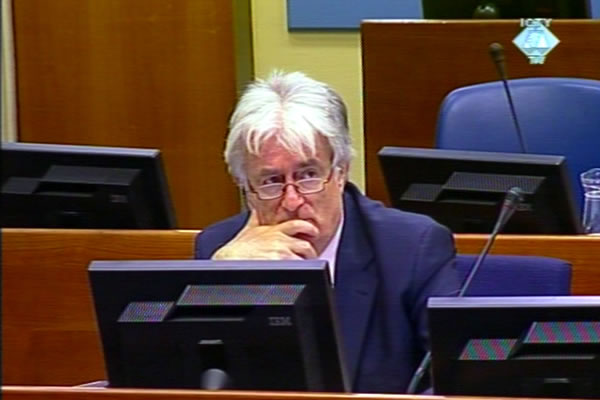Home
RADOVAN KARADZIC TRIAL ADJOURNED AGAIN
The trial of Radovan Karadzic will be adjourned again until 27 September 2010 after the testimony of the three witnesses that are already in The Hague. During the break Karadzic will study documents that – in his view – corroborate the defense’s argument that the VRS ‘fired on legitimate military targets’ in Sarajevo
 Radovan Karadzic in the courtroom
Radovan Karadzic in the courtroom After examining three witnesses slated to give evidence this week, the Trial Chamber with Korean judge O-Gon Kwon presiding will adjourn the trial of Radovan Karadzic until 27 September 2010. This will allow the accused to review the material confiscated during the search of apartments of two former VRS officers last year in Belgrade.
The Trial Chamber thus granted Karadzic’s request to adjourn his trial; the accused was, nevertheless, given only six working days instead of 12 he had asked for. This morning, the Trial Chamber initially decided to adjourn the trial from 15 to 23 September 2010. The accused complained he would not have enough time to go through the evidence because of his wife’s visit. The Trial Chamber then decided to adjourn the trial from 17 to 27 September 2010.
Protected witness KDZ 088 began his evidence last week; after he completes his evidence, three witnesses – Dr Bakir Nakas, Alma Mulaosmanovic-Cehajic and Francis Roy Thomas – will testify in following two or three days before the trial is adjourned.
As Judge Kwon said, the Trial Chamber has decided in ‘the interest of justice’ to allow the accused to review about 5,000 pages of confiscated documents. The material was seized in the apartments of former chief of Mladic’s security Dragomir Pecanac and commander of the VRS 10th Commando Platoon Milorad Pelemis. Although the prosecution received the material in January 2010, Karadzic received it on 31 August 2010.
In his urgent motion to adjourn the trial, Karadzic contends this is ‘precious exculpatory material’ which has been disclosed to him with some delay. In Karadzic’s view, the material is exculpatory because it lists the sites where BH Army troops and commands were stationed in Sarajevo during the siege.
Karadzic claims that the prosecution had had the documents for at least three months before it started calling witnesses. As Fatima Zaimovic and Milan Mandilovic testified about the shelling of health care facilities, the prosecution was ‘sitting on the information’ that shows the BH Army used health care facilities as their bases, Karadzic insisted.
Karadzic went on to claim that while UN witnesses – like David Harland, John Wilson, Colme Doyle, KDZ 185, Hussein Ali-Abdel Razek, Richade Mole and journalist Aernout van Lynden – testified about random shelling, the prosecution had information that ‘the BH Army placed its headquarters in kindergartens and primary schools’.
Karadzic faces charges of heavy shelling of civilian targets in Sarajevo. It is his case that the schools, kindergartens, hospitals and other facilities in the city were ‘legitimate military targets’. Karadzic contends that it was the BH Army that shelled civilians and ‘staged’ incidents with civilian victims to be able to blame the Serb side and gain sympathies of the international community.
Linked Reports
- Case : Karadzic
- 2010-09-06 KARADZIC: ‘IS SARAJEVO STILL WHERE IT ONCE WAS?’
- 2010-09-03 HOW LONG WILL KARADZIC'S TRIAL TAKE
- 2010-08-20 MLADIC’S DIARIES ADMITTED INTO EVIDENCE
- 2010-09-14 HOSPITAL CALLED ‘SWISS CHEESE’
- 2010-09-15 KARADZIC: EXCHANGE OF FIRE, NOT CRIME
- 2010-09-16 WITNESS: BH ARMY DIDN’T USE HEAVY ARTILLERY
